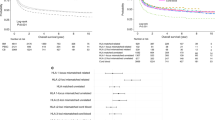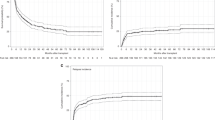Abstract
In unrelated hematopoietic SCT (HSCT), HLA allele mismatch has been shown to have a significant role. To clarify the importance of HLA allele mismatch in the GVH direction in related HSCT, we retrospectively evaluated 2377 patients who received stem cells from an HLA serologically matched related donor in the GVH direction using the database of the Japan Society for Hematopoietic Cell Transplantation. The cumulative incidences of grade II–IV and grade III–IV acute GVHD in patients with an HLA allele-mismatched donor (n=133, 5.6%) were significantly higher than those in patients with an HLA allele-matched donor. Multivariate analyses showed that the presence of HLA allele mismatch was associated with increased risks of grade II–IV and grade III–IV acute GVHD. In particular, HLA-B mismatch and multiple allele mismatches were associated with an increased risk of acute GVHD. The presence of HLA allele mismatch was associated with an inferior OS owing to an increased risk of non-relapse mortality (NRM). In conclusion, the presence of HLA allele mismatch in the GVH direction in related HSCT was associated with increased risks of GVHD and NRM, which led to an inferior OS. HLA allele typing is recommended in related HSCT.
This is a preview of subscription content, access via your institution
Access options
Subscribe to this journal
Receive 12 print issues and online access
$259.00 per year
only $21.58 per issue
Buy this article
- Purchase on Springer Link
- Instant access to full article PDF
Prices may be subject to local taxes which are calculated during checkout


Similar content being viewed by others
References
Park M, Seo JJ . Role of HLA in hematopoietic stem cell transplantation. Bone Marrow Res 2012; 2012: 680841.
Petersdorf EW . Optimal HLA matching in hematopoietic cell transplantation. Curr Opin Immunol 2008; 20: 588–593.
Morishima Y, Sasazuki T, Inoko H, Juji T, Akaza T, Yamamoto K et al. The clinical significance of human leukocyte antigen (HLA) allele compatibility in patients receiving a marrow transplant from serologically HLA-A, HLA-B, and HLA-DR matched unrelated donors. Blood 2002; 99: 4200–4206.
Woolfrey A, Klein JP, Haagenson M, Spellman S, Petersdorf E, Oudshoorn M et al. HLA-C antigen mismatch is associated with worse outcome in unrelated donor peripheral blood stem cell transplantation. Biol Blood Marrow Transplant 2011; 17: 885–892.
Kanda Y, Kanda J, Atsuta Y, Maeda Y, Ichinohe T, Ohashi K et al. Impact of a single human leucocyte antigen (HLA) allele mismatch on the outcome of unrelated bone marrow transplantation over two time periods. A retrospective analysis of 3003 patients from the HLA Working Group of the Japan Society for Blood and Marrow Transplantation. Br J Haematol 2013; 161: 566–577.
Lee SJ, Klein J, Haagenson M, Baxter-Lowe LA, Confer DL, Eapen M et al. High-resolution donor-recipient HLA matching contributes to the success of unrelated donor marrow transplantation. Blood 2007; 110: 4576–4583.
Flomenberg N, Baxter-Lowe LA, Confer D, Fernandez-Vina M, Filipovich A, Horowitz M et al. Impact of HLA class I and class II high-resolution matching on outcomes of unrelated donor bone marrow transplantation: HLA-C mismatching is associated with a strong adverse effect on transplantation outcome. Blood 2004; 104: 1923–1930.
Ciurea SO, Saliba RM, Rondon G, Patah PA, Aung F, Cano P et al. Outcomes of patients with myeloid malignancies treated with allogeneic hematopoietic stem cell transplantation from matched unrelated donors compared with one human leukocyte antigen mismatched related donors using HLA typing at 10 loci. Biol Blood Marrow Transplant 2011; 17: 923–929.
Valcarcel D, Sierra J, Wang T, Kan F, Gupta V, Hale GA et al. One-antigen mismatched related versus HLA-matched unrelated donor hematopoietic stem cell transplantation in adults with acute leukemia: Center for International Blood and Marrow Transplant Research results in the era of molecular HLA typing. Biol Blood Marrow Transplant 2011; 17: 640–648.
Kanda J, Saji H, Fukuda T, Kobayashi T, Miyamura K, Eto T et al. Related transplantation with HLA-1 Ag mismatch in the GVH direction and HLA-8/8 allele-matched unrelated transplantation: a nationwide retrospective study. Blood 2012; 119: 2409–2416.
Atsuta Y, Suzuki R, Yoshimi A, Gondo H, Tanaka J, Hiraoka A et al. Unification of hematopoietic stem cell transplantation registries in Japan and establishment of the TRUMP system. Int J Hematol 2007; 86: 269–274.
Przepiorka D, Weisdorf D, Martin P, Klingemann HG, Beatty P, Hows J et al. 1994 Consensus Conference on Acute GVHD Grading. Bone Marrow Transplant 1995; 15: 825–828.
Fine JP, Gray RJ . A proportional hazards model for the subdistribution of a competing risk. J Am Stat Assoc 1999; 94: 496–509.
Kanda Y . Investigation of the freely available easy-to-use software 'EZR' for medical statistics. Bone Marrow Transplant 2013; 48: 452–458.
Prasad VK, Heller G, Kernan NA, O'Reilly RJ, Yang SY . The probability of HLA-C matching between patient and unrelated donor at the molecular level: estimations based on the linkage disequilibrium between DNA typed HLA-B and HLA-C alleles. Transplantation 1999; 68: 1044–1050.
Petersdorf EW . The major histocompatibility complex: a model for understanding graft-versus-host disease. Blood 2013; 122: 1863–1872.
Acknowledgements
This work was supported in part by a Grant-in-Aid from the Ministry of Health, Labor and Welfare of Japan. We thank all the physicians and data managers at the centers who contributed valuable data on transplantation to the JSHCT. We also thank all the members of the data management committees of the JSHCT for their contributions.
Author information
Authors and Affiliations
Consortia
Corresponding author
Ethics declarations
Competing interests
The authors declare no conflict of interest.
Rights and permissions
About this article
Cite this article
Fuji, S., Kanda, J., Kato, S. et al. Impact of HLA allele mismatch on the clinical outcome in serologically matched related hematopoietic SCT. Bone Marrow Transplant 49, 1187–1192 (2014). https://doi.org/10.1038/bmt.2014.141
Received:
Revised:
Accepted:
Published:
Issue Date:
DOI: https://doi.org/10.1038/bmt.2014.141
This article is cited by
-
Prognostic Factors Contributing to the Survival of Hematopoietic Stem Cell Transplantation in the General Population with Leukemia: a Systematic Review
Regenerative Engineering and Translational Medicine (2023)
-
Does one model fit all? Predicting non-relapse mortality after allogeneic hematopoietic cell transplantation
Bone Marrow Transplantation (2021)
-
Long-term follow-up of a single institution pilot study of sirolimus, tacrolimus, and short course methotrexate for graft versus host disease prophylaxis in mismatched unrelated donor allogeneic stem cell transplantation
Annals of Hematology (2019)



